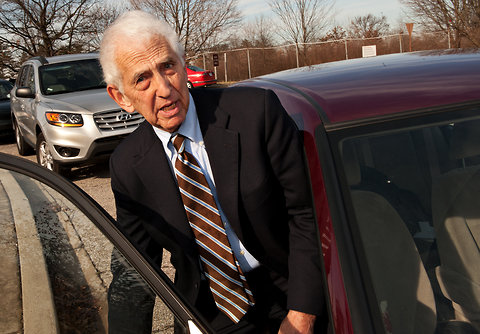 Paul J. Richards/Agence France-Presse — Getty Images Daniel Ellsberg, a board member of the Freedom of the Press Foundation, disclosed the Pentagon Papers in 1971.
Paul J. Richards/Agence France-Presse — Getty Images Daniel Ellsberg, a board member of the Freedom of the Press Foundation, disclosed the Pentagon Papers in 1971.
A group advocating a more transparent government has formed a nonprofit organization called the Freedom of the Press Foundation to serve as a conduit for donations to organizations like WikiLeaks. The goal is to insulate those groups’ fund-raising efforts from political and business pressures.
In December 2010, Visa, MasterCard and PayPal announced that they would no longer accept transactions for WikiLeaks, the online leak group that released thousands of secret documents from the American government. The move to cut off donations, which came after vocal protests against the organization’s activities from members of Congress, eliminated the vast majority of financing for WikiLeaks.
Board members of the Freedom of the Press Foundation include Daniel Ellsberg, the whistle-blower who disclosed the Pentagon Papers; Glenn Greenwald, a journalist who writes about civil liberties for The Guardian; John Perry Barlow, a co-founder of the Electronic Frontier Foundation; Xeni Jardin of the Web site Boing Boing; and John Cusack, an actor who has been a vocal opponent of government secrecy.
The foundation has created a Web site, which was scheduled to go online Sunday night, that will allow visitors to donate anonymously to various journalistic and investigative projects. By accepting donations for more than one organization, the site hopes to prevent any single one of them from being targeted.
In addition to WikiLeaks, the site will take donations for MuckRock News, which serves as a proxy and a guide for people seeking to make Freedom of Information requests; The UpTake, a citizen journalism site that generates online video news; and the National Security Archive, a repository of declassified government documents. There will be a rotating list of participating organizations expected to receive financing.
“We believe in openness in government, in transparency, and we don’t think that WikiLeaks alone should have to bear that burden,” Mr. Barlow said. “We are also hoping to support others of the same ilk, organizations that can serve an important journalistic function at a very important time.”
Mr. Ellsberg said that WikiLeaks’ future was in doubt because 95 percent of its donations had effectively been blocked. He said he hoped the foundation would help ensure the survival of the site, which has served as a repository for people seeking to expose secret dealings by governments.
“WikiLeaks is not perfect, but whatever mistakes it might have made, it serves a legitimate and necessary function in exposing an administration that is completely lacking in transparency,” Mr. Ellsberg said.
After WikiLeaks released a huge cache of secret State Department cables in November 2010 — many of which were published in The New York Times — it was sharply criticized by various government officials.
Representative Peter T. King, Republican of New York, wrote a letter to the secretary of state, Hillary Rodham Clinton, saying he believed that WikiLeaks met the criteria of a terrorist organization and that it presented “a clear and present danger to the national security of the United States.”
Soon afterward, Visa, MasterCard and PayPal announced that they would not accept donations for WikiLeaks. In a statement, MasterCard said its rules “prohibit customers from directly or indirectly engaging in or facilitating any action that is illegal.”
At the time, Julian Assange, the founder of WikiLeaks, denounced Visa, MasterCard and PayPal as “instruments of U.S. foreign policy.”
WikiLeaks suspended publication of documents in 2011 because of financial distress, which it said was a result of what it called “a banking blockade.”
“The cutoff in funds of WikiLeaks occurred without any court proceedings,” said Trevor Timm, co-founder and executive director of the Freedom of the Press Foundation. “By crowdsourcing funding for a variety of open-government initiatives, we can prevent the kind of commercial censorship that took place.”
A version of this article appeared in print on 12/17/2012, on page B4 of the NewYork edition with the headline: Group Aims to Be a Conduit For WikiLeaks Donations.
Article source: http://mediadecoder.blogs.nytimes.com/2012/12/16/group-aims-to-be-a-conduit-for-wikileaks-donations/?partner=rss&emc=rss
Speak Your Mind
You must be logged in to post a comment.